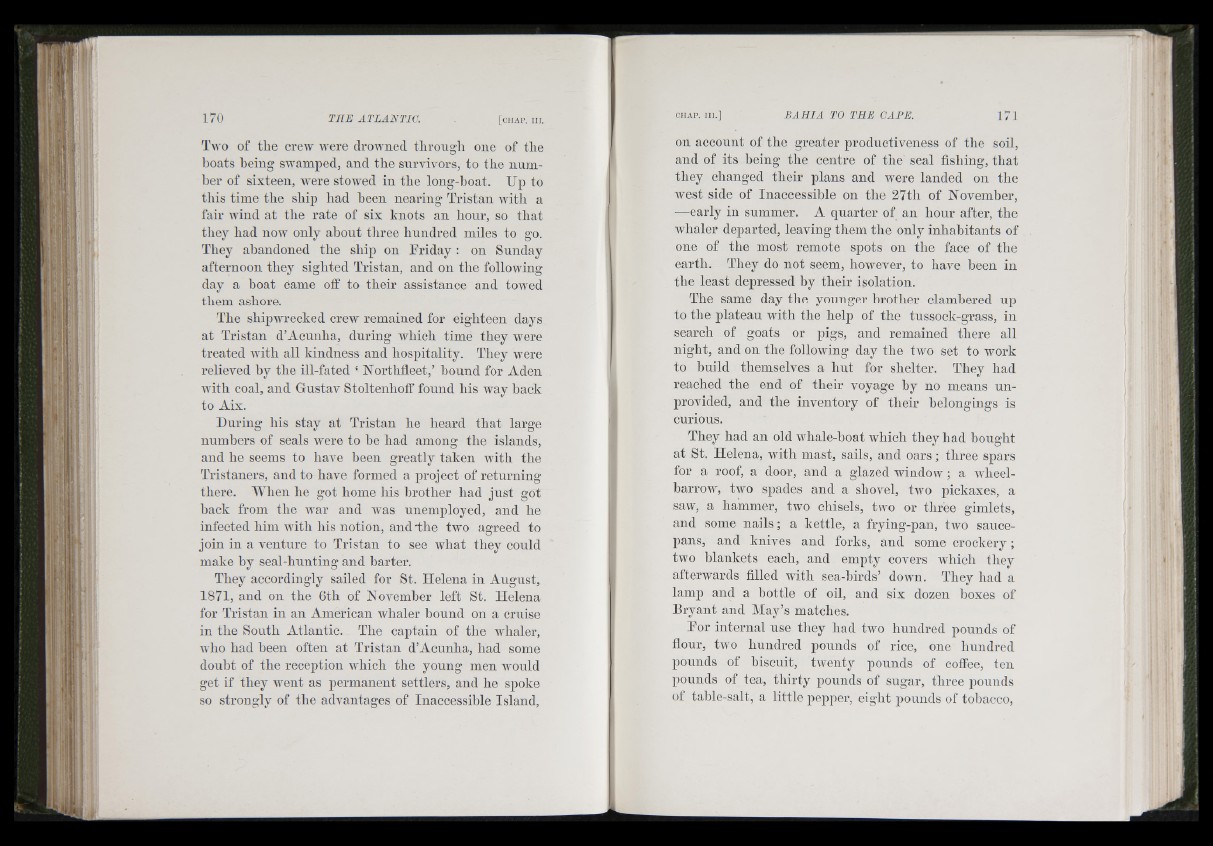
Two of tlie crew were drowned tlirongdi one of the
hoats heing sAA'amped, and the surA'iA'ors, to the iium-
her of sixteen, AA'ere stowed in the long-hoat. Up to
this time the ship had heen nearing Tristan with a
fair Avind at the rate of six knots an hour, so th a t
they had u o a v only ahout three hundred miles to go.
They abandoned the ship on Friday : on Sunday
afternoon they sighted Tristan, and on the folloAving
day a boat came off to their assistance and toAA'ed
them ashore.
The shipwrecked crew remained for eighteen days
at Tristan d’Acniiha, during AA'hich time they were
treated AA’ith all kindness and hospitality. They were
relieved by the ill-fated ‘ Northfleet,’ bound for Aden
AA'ith coal, and Gustav Stoltenhoff found his way back
to Aix.
During his stay at Tristan he heard th a t large
numbers of seals Avere to he had among the islands,
aud he seems to have heen greatly taken Avith the
Tristaners, and to have formed a project of returning
there. IVlien he got home his brother had ju st got
hack from the Avar and Avas unemployed, and he
infected him with his notion, and'the tAVO agreed to
join in a venture to Tristan to see what they could
make by seal-hunting and barter.
They accordingly sailed for St. Helena in August,
1871, and on the 6th of November left St. Helena
for Tristan in an American Avhaler hound on a cruise
in the South Atlantic. The captain of the whaler,
Avho had heen often at Tristan d’Acunha, had some
doubt of the reception Avhich the young men Avould
get if they Avent as permanent settlers, and he spoke
so strongly of the advantages of Inaccessible Island,
on account of the greater productiveness of the soil,
and of its being the centre of the seal fishing, that
they changed their plans and were landed on the
Avest side of Inaccessible on the 27th of November,
—early in summer. A quarter of an hour after, the
Avhaler departed, leaving them the only inliahitants of
one of the most remote spots on the face of the
earth. They do not seem, liowever, to have been in
the least depressed by their isolation.
The same day the younger brother clambered up
to the plateau with the help of the tussock-grass, in
search of goats or pigs, and remained there all
night, and on the following day the two set to work
to build themselves a hut for shelter. They had
reached the end of their voyage by no means unprovided,
and the inventory of their belongings is
curious.
They had an old AA'hale-hoat which they had bought
at St. Helena, Avith mast, sails, and o a rs ; three spars
for a roof, a door, and a glazed Avindow ; a Avheel-
harroAA', two spades and a shovel, two pickaxes, a
saw, a hammer, tAvo chisels, two or tliree gimlets,
and some n a ils ; a kettle, a frying-pan, tAvo saucepans,
and knives and forks, and some crockery;
two blankets each, and empty covers AA'hich they
afteiuvards filled with sea-hirds’ doAvn. They had a
lamp and a bottle of oil, and six dozen boxes of
Bryant and May’s matches.
For internal use they had tAVO hundred pounds of
flour, two hundred pounds of rice, one hundred
pounds of biscuit, tAventy pounds of coffee, ten
pounds of tea, th irty ]oounds of sugar, tliree jiounds
ol table-salt, a little jiepper, eight jiounds of tobacco.